| Listing 1 - 10 of 28 | << page >> |
Sort by
|
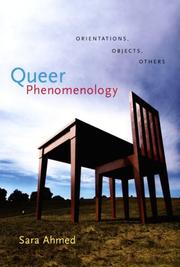
ISBN: 9780822339144 0822339145 9780822338611 0822338610 Year: 2006 Publisher: Durham; ; London : Duke University Press,
Abstract | Keywords | Export | Availability | Bookmark
 Loading...
Loading...Choose an application
- Reference Manager
- EndNote
- RefWorks (Direct export to RefWorks)
In this groundbreaking work, Sara Ahmed demonstrates how queer studies can put phenomenology to productive use. Focusing on the “orientation” aspect of “sexual orientation” and the “orient” in “orientalism,” Ahmed examines what it means for bodies to be situated in space and time. Bodies take shape as they move through the world directing themselves toward or away from objects and others. Being “orientated” means feeling at home, knowing where one stands, or having certain objects within reach. Orientations affect what is proximate to the body or what can be reached. A queer phenomenology, Ahmed contends, reveals how social relations are arranged spatially, how queerness disrupts and reorders these relations by not following the accepted paths, and how a politics of disorientation puts other objects within reach, those that might, at first glance, seem awry. Ahmed proposes that a queer phenomenology might investigate not only how the concept of orientation is informed by phenomenology but also the orientation of phenomenology itself. Thus she reflects on the significance of the objects that appear—and those that do not—as signs of orientation in classic phenomenological texts such as Husserl’s Ideas. In developing a queer model of orientations, she combines readings of phenomenological texts—by Husserl, Heidegger, Merleau-Ponty, and Fanon—with insights drawn from queer studies, feminist theory, critical race theory, Marxism, and psychoanalysis. Queer Phenomenology points queer theory in bold new directions.
Philosophical anthropology --- 82-993 --- Erotische literatuur --- Homosexuality --- Spatial behavior. --- Philosophy. --- fenomenologie --- Theatrical science --- 82-993 Erotische literatuur --- Homosexualité --- Comportement spatial --- Philosophie --- Homosexualité --- Spatial behavior --- Behavior, Spatial --- Proxemic behavior --- Space behavior --- Spatially-oriented behavior --- Psychology --- Space and time --- Philosophy --- homosexuality --- Filosofische antropologie --- Theaterwetenschap --- homoseksualiteit --- phenomenology --- Comportement spatial. --- Personnes queers. --- Philosophie.
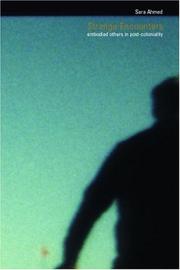
ISBN: 0415201853 9780415201858 0415201845 9780203349700 9781135120047 9781135120115 9781135120184 9780415201841 1135120110 0203349709 1135120048 1299147666 Year: 2000 Publisher: London Routledge
Abstract | Keywords | Export | Availability | Bookmark
 Loading...
Loading...Choose an application
- Reference Manager
- EndNote
- RefWorks (Direct export to RefWorks)
Using feminist and postcolonial theory this book examines the impact of multiculturalism and globalization on embodiment and community, while considering the ethical and political implication of its critique for post-colonial feminism.
#SBIB:39A6 --- #SBIB:309H023 --- Etniciteit / Migratiebeleid en -problemen --- Interculturele en internationale communicatie --- Feminist theory. --- Immigrants. --- Intercultural communication. --- Minorities. --- Strangers. --- Feminist theory --- Immigrants --- Intercultural communication --- Minorities --- Strangers --- Persons --- Ethnic minorities --- Foreign population --- Minority groups --- Assimilation (Sociology) --- Discrimination --- Ethnic relations --- Majorities --- Plebiscite --- Race relations --- Segregation --- Cross-cultural communication --- Communication --- Culture --- Cross-cultural orientation --- Cultural competence --- Multilingual communication --- Technical assistance --- Emigrants --- Foreign-born population --- Foreigners --- Migrants --- Aliens --- Feminism --- Feminist philosophy --- Feminist sociology --- Theory of feminism --- Anthropological aspects --- Philosophy --- Immigrés --- Minorités --- Communication interculturelle --- Etrangers --- Théorie féministe
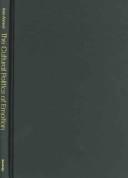
ISBN: 9780748691135 0748691138 9780748691142 9780748691159 0748691146 9781135205706 1135205701 9781322059709 1322059705 0748691154 9781138805033 1138805033 9780415972543 041597254X 0415972558 9780415972550 Year: 2014 Publisher: Edinburgh Edinburgh University Press
Abstract | Keywords | Export | Availability | Bookmark
 Loading...
Loading...Choose an application
- Reference Manager
- EndNote
- RefWorks (Direct export to RefWorks)
Emotions work to define who we are as well as shape what we do and this is no more powerfully at play than in the world of politics. Ahmed considers how emotions keep us invested in relationships of power, and also shows how this use of emotion could be crucial to areas such as feminist and queer politics. Debates on international terrorism, asylum and migration, as well as reconciliation and reparation, are explored through topical case studies. In this book the difficult issues are confronted head on. The Cultural Politics of Emotion is in dialogue with recent literature on emotions within gender studies, cultural studies, sociology, psychology and philosophy. Throughout the book, Ahmed develops a theory of how emotions work, and the effects they have on our day-to-day lives. New for this edition A substantial 15,000-word Afterword on'Emotions and Their Objects'which provides an original contribution to the burgeoning field of affect studies A revised Bibliography Updated throughout.
Emotions --- Language and emotions --- Political psychology. --- Political culture. --- Psychologie politique --- Culture politique --- Social aspects. --- Political aspects. --- Aspect social --- Langage et émotions --- Political aspects --- Aspect politique --- Langage et émotions --- politics --- sensation --- Sociology of culture --- Affective and dynamic functions --- Political sociology --- emotion --- Sociology of minorities --- homosexuality --- feminism --- minderheden --- Culturele verschillen. --- Emoties. --- Gefühl. --- Politik. --- Politische Kultur. --- Psychologie. --- Soziales. --- Soziokultureller Faktor. --- Political culture --- Political psychology --- #SBIB:316.7C140 --- #SBIB:39A4 --- 316.613.4 --- Culturele verschillen --- Emoties --- Mass political behavior --- Political behavior --- Political science --- Politics, Practical --- Psychology, Political --- Psychology --- Social psychology --- Culture --- Social aspects --- Cultuursociologie: cultuur en globale samenlevingen --- Toegepaste antropologie --- Sociale gevoelens. Emoties --- Psychological aspects --- UmU kursbok --- emoties --- 316.613.4 Sociale gevoelens. Emoties --- Emotions. --- Affect (Psychology) --- Affective neuroscience --- Apathy --- Pathognomy --- Feelings --- Human emotions --- Passions --- Émotions --- Société. --- Émotions --- Société. --- Perception sensible --- Emotion --- Groupe social --- Politique et pouvoirs publics
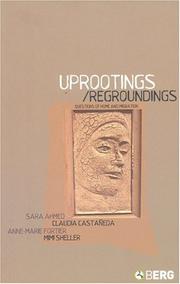
ISBN: 1859736297 1859736246 Year: 2003 Publisher: New York (N.Y.) : Berg,
Abstract | Keywords | Export | Availability | Bookmark
 Loading...
Loading...Choose an application
- Reference Manager
- EndNote
- RefWorks (Direct export to RefWorks)
What is the relationship between leaving home and the imagining of home itself? And having left home, what might it mean to return? How can we re-think what it means to be grounded, or to stay put? Who moves and who stays? What interaction is there between those who stay and those who arrive and leave? Focusing on differences of race, gender, class and sexuality, the contributors reveal how the movements of bodies and communities are intrinsic to the making of homes, nations, identities and boundaries. They reflect on the different experiences of being at home, leaving home, and going home. They also explore ways in which attachment to place and locality can be secured--as well as challenged--through the movements that make up our dwelling places.
#SBIB:39A6 --- Etniciteit / Migratiebeleid en -problemen --- Emigration and immigration -- Psychological aspects. --- Emigration and immigration. --- Moving, Household -- Psychological aspects. --- Emigration and immigration --- Moving, Household --- Assimilation (Sociology) --- Identity (Psychology) --- Home --- Strangers --- Immigrants --- Political Science --- Law, Politics & Government --- Immigration & Emigration --- Psychological aspects --- Psychology --- Home. --- Strangers. --- Psychological aspects. --- Psychology. --- Assimilation (Sociology). --- Identity (Psychology).
Book
ISBN: 9780822346661 9780822347255 Year: 2010 Publisher: Durham, N.C. Duke University Press
Abstract | Keywords | Export | Availability | Bookmark
 Loading...
Loading...Choose an application
- Reference Manager
- EndNote
- RefWorks (Direct export to RefWorks)
The Promise of Happiness is a provocative cultural critique of the imperative to be happy. It asks what follows when we make our desires and even our own happiness conditional on the happiness of others: “I just want you to be happy”; “I’m happy if you’re happy.” Combining philosophy and feminist cultural studies, Sara Ahmed reveals the affective and moral work performed by the “happiness duty,” the expectation that we will be made happy by taking part in that which is deemed good, and that by being happy ourselves, we will make others happy. Ahmed maintains that happiness is a promise that directs us toward certain life choices and away from others. Happiness is promised to those willing to live their lives in the right way. Ahmed draws on the intellectual history of happiness, from classical accounts of ethics as the good life, through seventeenth-century writings on affect and the passions, eighteenth-century debates on virtue and education, and nineteenth-century utilitarianism. She engages with feminist, antiracist, and queer critics who have shown how happiness is used to justify social oppression, and how challenging oppression causes unhappiness. Reading novels and films including Mrs. Dalloway, The Well of Loneliness, Bend It Like Beckham, and Children of Men, Ahmed considers the plight of the figures who challenge and are challenged by the attribution of happiness to particular objects or social ideals: the feminist killjoy, the unhappy queer, the angry black woman, and the melancholic migrant. Through her readings she raises critical questions about the moral order imposed by the injunction to be happy.
Happiness. --- Social norms. --- Social control. --- 316.62 --- Social conflict --- Sociology --- Liberty --- Pressure groups --- Folkways --- Norms, Social --- Rules, Social --- Social rules --- Manners and customs --- Social control --- Gladness --- Emotions --- Cheerfulness --- Contentment --- Pleasure --- Well-being --- Sociaal gedrag. Leefstijl --- 316.62 Sociaal gedrag. Leefstijl --- Bonheur --- Normes sociales --- Contrôle social --- Contrôle social --- Happiness --- Social norms --- Developmental psychology --- Social psychology --- Sociology of the family. Sociology of sexuality
Book
ISBN: 9780822352211 9780822352365 0822352214 0822352362 1280687304 0822395320 9786613664242 9780822395324 Year: 2012 Publisher: Durham, N.C. Duke University Press
Abstract | Keywords | Export | Availability | Bookmark
 Loading...
Loading...Choose an application
- Reference Manager
- EndNote
- RefWorks (Direct export to RefWorks)
What does diversity do? What are we doing when we use the language of diversity? Sara Ahmed offers an account of the diversity world based on interviews with diversity practitioners in higher education, as well as her own experience of doing diversity work. Diversity is an ordinary, even unremarkable, feature of institutional life. Yet diversity practitioners often experience institutions as resistant to their work, as captured through their use of the metaphor of the "brick wall." On Being Included offers an explanation of this apparent paradox. It explores the gap between symbolic commitments to diversity and the experience of those who embody diversity. Commitments to diversity are understood as "non-performatives" that do not bring about what they name. The book provides an account of institutional whiteness and shows how racism can be obscured by the institutionalization of diversity. Diversity is used as evidence that institutions do not have a problem with racism. On Being Included offers a critique of what happens when diversity is offered as a solution. It also shows how diversity workers generate knowledge of institutions in attempting to transform them
Minorities in higher education. --- Racism in higher education. --- Education, Higher --- Cultural pluralism. --- Universities and colleges --- #SBIB:316.8H16 --- Cultural diversity --- Diversity, Cultural --- Diversity, Religious --- Ethnic diversity --- Pluralism (Social sciences) --- Pluralism, Cultural --- Religious diversity --- Culture --- Cultural fusion --- Ethnicity --- Multiculturalism --- Social aspects. --- Sociological aspects. --- Welzijns- en sociale problemen: migranten, rassenrelaties --- Sociology of minorities --- Higher education --- Cultural pluralism --- Minorities in higher education --- Racism in higher education --- Social aspects --- Sociological aspects --- Sociologie van de minderheden --- Hoger onderwijs. Universitair onderwijs --- United Kingdom --- Australia --- Cultural Diversity --- Cultural Pluralism --- Pluralism --- Cultural Diversities --- Diversities, Cultural --- Multiculturalisms --- Pluralisms --- Ethical Relativism --- Cultural Diversity. --- Race --- Racism --- Black feminism --- Book
Book
ISBN: 9780822357674 9780822357834 0822357836 0822357674 0822376105 Year: 2014 Publisher: Duke University Press
Abstract | Keywords | Export | Availability | Bookmark
 Loading...
Loading...Choose an application
- Reference Manager
- EndNote
- RefWorks (Direct export to RefWorks)
In Willful Subjects Sara Ahmed explores willfulness as a charge often made by some against others. One history of will is a history of attempts to eliminate willfulness from the will. Delving into philosophical and literary texts, Ahmed examines the relation between will and willfulness, ill will and good will, and the particular will and general will. Her reflections shed light on how will is embedded in a political and cultural landscape, how it is embodied, and how will and willfulness are socially mediated. Attentive to the wayward, the wandering, and the deviant, Ahmed considers how willfulness is taken up by those who have received its charge. Grounded in feminist, queer, and antiracist politics, her sui generis analysis of the willful subject, the figure who wills wrongly or wills too much, suggests that willfulness might be required to recover from the attempt at its elimination.
Wilsonbekwaamheid --- Filosofie --- Will. --- Will --- Philosophy. --- Social aspects. --- Volonté --- Philosophy --- Social aspects --- Philosophie --- Aspect social --- Volonté --- Feminism --- Oudheid --- China --- Romeinse Rijk --- Hellenisme --- Griekenland --- Hellas --- Film --- Literatuur --- Muziek --- Schilderkunst --- Tekenkunst --- Vlaanderen --- Vlaams --- Emigratie --- Vrouw --- Will - Philosophy --- Will - Social aspects --- Cetanā --- Conation --- Volition --- Ethics --- Psychology --- Self
Book
ISBN: 9780822363040 0822363046 9780822363194 0822363194 9780822373377 0822373378 Year: 2017 Publisher: Durham : Duke University Press,
Abstract | Keywords | Export | Availability | Bookmark
 Loading...
Loading...Choose an application
- Reference Manager
- EndNote
- RefWorks (Direct export to RefWorks)
In Living a Feminist Life Sara Ahmed shows how feminist theory is generated from everyday life and the ordinary experiences of being a feminist at home and at work. Building on legacies of feminist of color scholarship in particular, Ahmed offers a poetic and personal meditation on how feminists become estranged from worlds they critique—often by naming and calling attention to problems—and how feminists learn about worlds from their efforts to transform them. Ahmed also provides her most sustained commentary on the figure of the feminist killjoy introduced in her earlier work while showing how feminists create inventive solutions—such as forming support systems—to survive the shattering experiences of facing the walls of racism and sexism. The killjoy survival kit and killjoy manifesto, with which the book concludes, supply practical tools for how to live a feminist life, thereby strengthening the ties between the inventive creation of feminist theory and living a life that sustains it. -- Provided by publisher.
Feminist theory. --- Feminism. --- Political philosophy. Social philosophy --- Sociology of the family. Sociology of sexuality --- Feminism --- Feminist philosophy --- Feminist sociology --- Theory of feminism --- Emancipation of women --- Feminist movement --- Women --- Women's lib --- Women's liberation --- Women's liberation movement --- Women's movement --- Philosophy --- Emancipation --- Feminist theory --- #SBIB:316.346H10 --- Vrouwenproblematiek, feminisme: algemeen --- Social movements --- Anti-feminism --- women's movement --- sexual minority --- 7.01 --- Feminisme --- maatschappijkritiek ; activisme --- Kunst ; theorie, filosofie, esthetica --- Théorie féministe --- Féminisme --- Theory --- Book --- Daily life --- Experiences
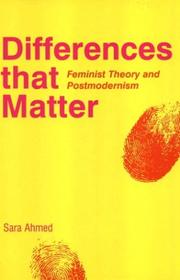
ISBN: 0521597617 0521592259 1107114349 0511172222 051100463X 0511150342 0511324650 0511489382 1280432128 0511054327 9780511004636 9780511489389 9780521592253 9780521597616 9781107114340 9781280432125 9780511172229 9780511150340 9780511324659 9780511054327 Year: 1998 Publisher: Cambridge : Cambridge university press,
Abstract | Keywords | Export | Availability | Bookmark
 Loading...
Loading...Choose an application
- Reference Manager
- EndNote
- RefWorks (Direct export to RefWorks)
Differences That Matter challenges existing ways of theorising the relationship between feminism and postmodernism which ask 'is or should feminism be modern or postmodern?' Sara Ahmed suggests that postmodernism has been allowed to dictate feminist debates and calls instead for feminist theorists to speak (back) to postmodernism, rather than simply speak on (their relationship to) it. Such a 'speaking back' involves a refusal to position postmodernism as a generalisable condition of the world and requires closer readings of what postmodernism is actually 'doing' in a variety of disciplinary contexts. Sara Ahmed hence examines constructions of postmodernism in relation to rights, ethics, subjectivity, authorship, meta-fiction and film.
Feminist theory. --- Postmodernism. --- 165.76 --- 396 --- 396 Feminisme. Vrouwenbeweging. Vrouw en maatschappij --- Feminisme. Vrouwenbeweging. Vrouw en maatschappij --- 165.76 Postmodernisme. Poststructuralisme. Post-modernisme. Post-structuralisme --- Postmodernisme. Poststructuralisme. Post-modernisme. Post-structuralisme --- Feminist theory --- Postmodernism --- Post-modernism --- Postmodernism (Philosophy) --- Arts, Modern --- Avant-garde (Aesthetics) --- Modernism (Art) --- Philosophy, Modern --- Post-postmodernism --- Feminism --- Feminist philosophy --- Feminist sociology --- Theory of feminism --- Philosophy --- 396 Feminism. Women's movement. Woman and society --- Feminism. Women's movement. Woman and society --- Social Sciences --- Sociology
Book
ISBN: 9781478006503 9781478005841 147800584X 1478006501 9781478007210 Year: 2019 Publisher: Durham Duke University Press
Abstract | Keywords | Export | Availability | Bookmark
 Loading...
Loading...Choose an application
- Reference Manager
- EndNote
- RefWorks (Direct export to RefWorks)
In What's the Use? Sara Ahmed continues the work she began in The Promise of Happiness and Willful Subjects by taking up a single word--in this case, use--and following it around. She shows how use became associated with life and strength in nineteenth-century biological and social thought and considers how utilitarianism offered a set of educational techniques for shaping individuals by directing them toward useful ends. Ahmed also explores how spaces become restricted to some uses and users, with specific reference to universities. She notes, however, the potential for queer use: how things can be used in ways that were not intended or by those for whom they were not intended. Ahmed posits queer use as a way of reanimating the project of diversity work as the ordinary and painstaking task of opening up institutions to those who have historically been excluded.--
Ahmed, Sara --- Utilitarianism --- Education, Higher --- Universities and colleges --- Queer theory --- Philosophy --- Social aspects --- Sociological aspects --- Nutzen. --- Nutzung. --- Philosophie. --- Queer theory. --- Queer-Theorie. --- Society. --- Universität. --- Utilitarismus. --- Social aspects. --- Sociological aspects. --- 1800-1899. --- Sociology of culture --- Sociology of the family. Sociology of sexuality --- Utilitarianism - Philosophy - 19th century --- Education, Higher - Social aspects --- Universities and colleges - Sociological aspects --- Queer --- Theory --- Women's studies --- Book
| Listing 1 - 10 of 28 | << page >> |
Sort by
|

 Search
Search Feedback
Feedback About UniCat
About UniCat  Help
Help News
News